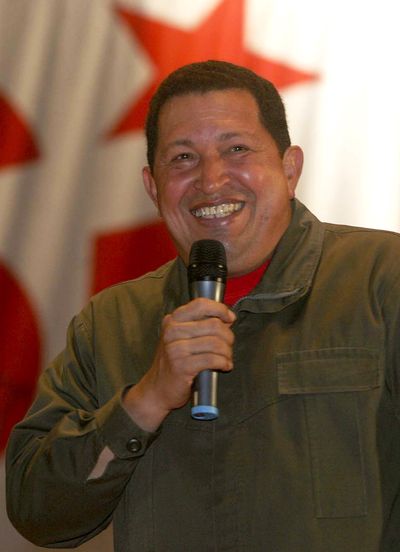Oil freefall could mean trouble for Chavez
Venezuela shelving his touted free fuel program

CARACAS, Venezuela – High oil prices allowed Venezuelan President Hugo Chavez to spend freely to spread his socialist gospel and challenge the U.S. role as the dominant player in Latin American and the Caribbean.
The sharp drop in oil prices is imperiling those ambitions, analysts said Tuesday, a day after the Venezuelan government announced that it is suspending free heating oil to poor people in the U.S. Oil accounts for 93 percent of the government’s export income and about 50 percent of its overall income.
“Hemispheric politics are suddenly becoming too expensive for Chavez,” said Carlos Alberto Lopez, an energy consultant in Bolivia. “He will have to allocate his dwindling resources to sustaining his political position in Venezuela.”
Chavez is facing a crucial political test in the near term. He’s asking Venezuelan voters to lift term limits so that he can seek re-election once again in 2012. The national referendum could be held as soon as Feb. 15.
Polls show that Chavez trails by 20 or so points and can’t risk reversing his enormous expansion of government spending aimed at the poor, his core group of supporters.
That puts oil subsidies and other foreign assistance programs throughout Latin American and the Caribbean on the chopping block.
Recent news reports have put in doubt whether Petroleos de Venezuela, the state oil company better known as PDVSA, can finance planned oil refineries in Ecuador and Nicaragua, two Chavez allies.
Another potential target: the Petrocaribe program under which Venezuela sells 56,000 barrels a day of oil and diesel to nearly 20 Caribbean and Central American countries under generous terms. The countries have to pay for only about half of the oil, with the rest to be paid over a 25-year period.
The program paid dividends in 2006 when the 15-nation Caribbean Community backed Venezuela’s bid for one of the 10 rotating seats on the U.N. Security Council, although the effort ultimately was unsuccessful.
Venezuela also sells 15,000 barrels a day of subsidized oil to Central American nations and an unknown amount of subsidized diesel to Bolivia.
The Chavez government also provides nearly 100,000 barrels a day of oil and oil products to Cuba, a close ally. The price to Cuba is unknown but is likely free.